Ivor Horton - Using the C++ Standard Template Libraries
Here you can read online Ivor Horton - Using the C++ Standard Template Libraries full text of the book (entire story) in english for free. Download pdf and epub, get meaning, cover and reviews about this ebook. year: 2015, publisher: Apress, genre: Computer. Description of the work, (preface) as well as reviews are available. Best literature library LitArk.com created for fans of good reading and offers a wide selection of genres:
Romance novel
Science fiction
Adventure
Detective
Science
History
Home and family
Prose
Art
Politics
Computer
Non-fiction
Religion
Business
Children
Humor
Choose a favorite category and find really read worthwhile books. Enjoy immersion in the world of imagination, feel the emotions of the characters or learn something new for yourself, make an fascinating discovery.
- Book:Using the C++ Standard Template Libraries
- Author:
- Publisher:Apress
- Genre:
- Year:2015
- Rating:4 / 5
- Favourites:Add to favourites
- Your mark:
- 80
- 1
- 2
- 3
- 4
- 5
Using the C++ Standard Template Libraries: summary, description and annotation
We offer to read an annotation, description, summary or preface (depends on what the author of the book "Using the C++ Standard Template Libraries" wrote himself). If you haven't found the necessary information about the book — write in the comments, we will try to find it.
Using the C++ Standard Template Libraries — read online for free the complete book (whole text) full work
Below is the text of the book, divided by pages. System saving the place of the last page read, allows you to conveniently read the book "Using the C++ Standard Template Libraries" online for free, without having to search again every time where you left off. Put a bookmark, and you can go to the page where you finished reading at any time.
Font size:
Interval:
Bookmark:
- What is in the STL
- How templates are defined and used
- What a container is
- What an iterator is and how it is used
- The importance of smart pointers and their use with containers
- What algorithms are and how you apply them
- What is provided by the numerics library
- What a function object is
- How lambda expressions are defined and used
- The Containers Library defines containers for storing and managing data. The templates for this library are defined within the following header files: array , vector , stack , queue , deque , list , forward_list , set , unordered_set , map , and unordered_map .
- The Iterators Library defines iterators, which are objects that behave like pointers and are used to reference sequences of objects in a container. The library is defined within a single header file, iterator .
- The Algorithms Library defines a wide range of algorithms that can be applied to a set of elements stored in a container. The templates for this library are defined in the algorithm header file.
- The Numerics Library defines a wide range of numerical functions, including numerical processing of sets of elements in a container. The library also includes advanced functions for random number generation. The templates for this library are defined in the headers complex , cmath , valarray , numeric , random , ratio , and cfenv . The cmath header has been around for a while, but it has been extended in the C++ 11 standard and is included here because it contains many mathematical functions.
Font size:
Interval:
Bookmark:
Similar books «Using the C++ Standard Template Libraries»
Look at similar books to Using the C++ Standard Template Libraries. We have selected literature similar in name and meaning in the hope of providing readers with more options to find new, interesting, not yet read works.
Discussion, reviews of the book Using the C++ Standard Template Libraries and just readers' own opinions. Leave your comments, write what you think about the work, its meaning or the main characters. Specify what exactly you liked and what you didn't like, and why you think so.

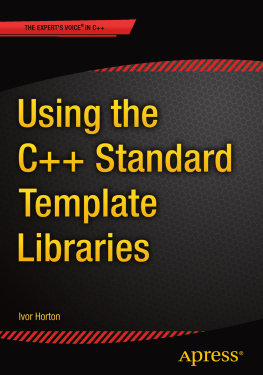

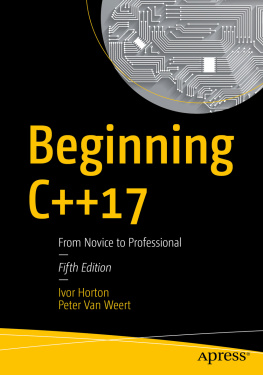
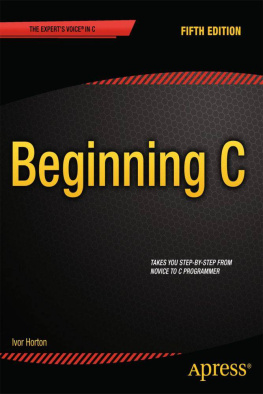
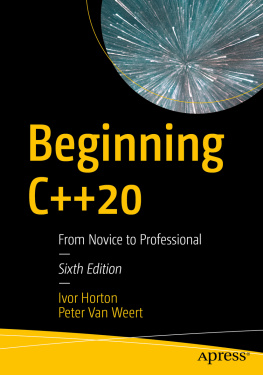



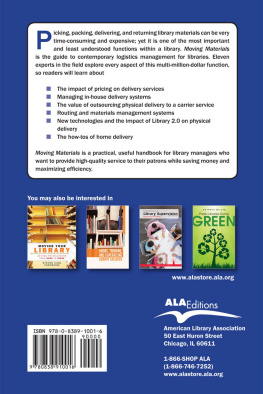
![Ivor Horton [Ivor Horton] - Ivor Horton’s Beginning Java®, Java 7 Edition](/uploads/posts/book/119392/thumbs/ivor-horton-ivor-horton-ivor-horton-s.jpg)